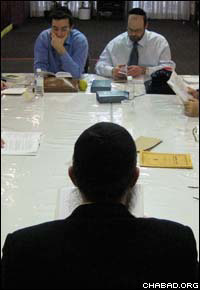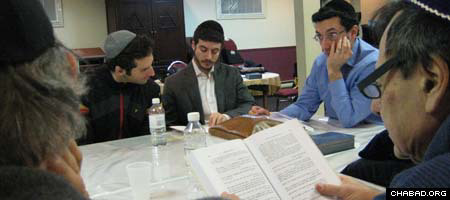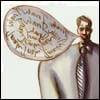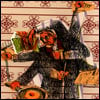Some would call the way 10 Jewish men and women in Montreal push off their work days in order to learn a Jewish text for 45 minutes downright stubborn. But while these professionals admit that they're nothing if not persistent, they contend that their daily study of the Tanya, the bedrock text of Chabad Chasidic thought, is a necessity in a harried world.
They've been going at it for a full year. Day in day out. Yom Kippur and Labor Day alike.
"If you think about it, in a normal world it would be hard to get 10 people to do the same thing every day, the whole year, not to mention studying something as heavy as the Tanya," says David Medina, a young resident of Montreal's old city.
Medina, an executive of a family-owned firm that inspects industrial food manufacturers, begins his day promptly at 4:45 a.m. with a morning jog before driving to Chabad Queen Mary, the Chabad-Lubavitch synagogue where he learns Tanya after the morning prayer service.
He sounds pretty mystified when talking about the 45-minute lesson led by Rabbi Ronnie Fine, the Chabad House's co-director. The daily exploration frequently deviates from the original text and morphs into a full-headed discussion about Jewish beliefs and practices.
"The text of the Tanya is simply magical and I can't explain why," says Medina. "For me, it's a daily philosophy. While the Tanya is a spiritual book with profound depth, it gives you tools for the rest of the day: how to deal with depression and negativity, and the meaning of prayer and charity. As a daily text, it's powerful."
Written by the Alter Rebbe, Rabbi Schneur Zalman of Liadi, of righteous memory, and published in the late 18th century, the Tanya is the central text of Chabad Chasidism. Its stated aim is to show a path to realizing one's purpose and developing a deeper relationship with G‑d.
The Sixth Lubavitcher Rebbe, Rabbi Yosef Yitzchak Schneersohn, of righteous memory, encouraged the custom of learning a daily portion of Tanya – in addition to a section of the week's Torah portion and a collection of Psalms – so that it would be completed in a year, beginning and ending on the 19th day of the Hebrew month of Kislev.
The 19th of Kislev, which this year occurs on Thursday, Nov. 29, commemorates the date in 1798 that the Alter Rebbe was released from a Czarist prison. He had been falsely charged as an enemy of the state because of his Chasidic teachings. Chabad-Lubavitch Chasidim, therefore, celebrate the date of his release as a joyous holiday.
It was on the date last year that Fine told his congregants that he would give a lesson on the daily portion of the Tanya for anyone who chose to attend.
"It was a decision of the moment, but really good timing," recalls Fine, who with his wife Simcha Fine established the Chabad House eight years ago.
The Montreal 10 are not the only ones who have taken on the daily learning of Tanya. According to Chabad.org, more than 20,000 people subscribe to the Web site's daily Tanya learning e-mail. Tens of thousands more access the day's Tanya lesson directly from the site.
According to the rabbi, the daily lesson has added a certain vibrancy to the community center.
"There is a Chassidic saying: Alcohol will always make you drunk, money will make you nuts and Chassidism will always refine," he explains. "I've had people who found it hard to understand in the beginning and later became the very 'vessel' to understand G‑dliness that the Tanya discusses."
The rabbi, currently finalizing arrangements for a Dec. 2 celebratory dinner in honor of the Tanya class – noted theologian Rabbi Yossi Jacobson is scheduled to deliver an address on "Unlocking Secrets of Kabbalah."
The Good in Life

But he still needed to get used to some of the arcane terms and concepts introduced and expounded on in the pages of the Tanya.
"It certainly is a challenge for me, and I make an effort every day to understand," says Jacobs. "It gives me a perspective on the good and bad, and teaches me to live a good, moral life."
With a smirk on his face, Jacobs doesn't forget to mention the quarter-to-seven wakeup call he receives from Fine every day.
"He's persistent. Sometimes I don't pick up, because I know it's him," he continues. "He even calls when I'm out of town."
Daniel Gavsie, a friend of Medina's from childhood, found the Tanya a bit surreptitiously.
He and Medina had only a smattering of exposure to Jewish teachings and customs before college in Toronto. Gavsie took up massage therapy while Medina studied law.
Upon their return to Montreal, Medina began keeping Shabbat on his own. Gavsie soon joined the observance and the two started "synagogue shopping" to find the right place to go to.
"I heard about Chabad through one of my clients," says Gavsie, 33, owner of a spa and health clinic in Westmount, Quebec. "She suggested Rabbi Fine and I never looked back.
"I see the Tanya class as a massage to the soul."
Gavsie spent this Tuesday in the Fine residence with his future bride, reviewing wedding plans. "I want our home to be the most Jewish possible."








Start a Discussion